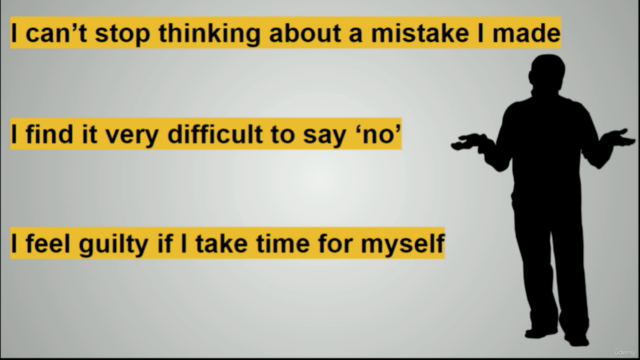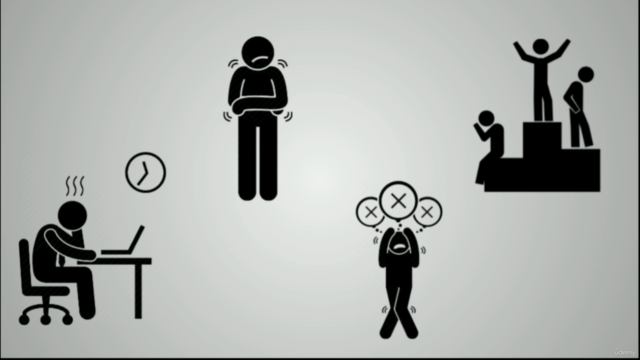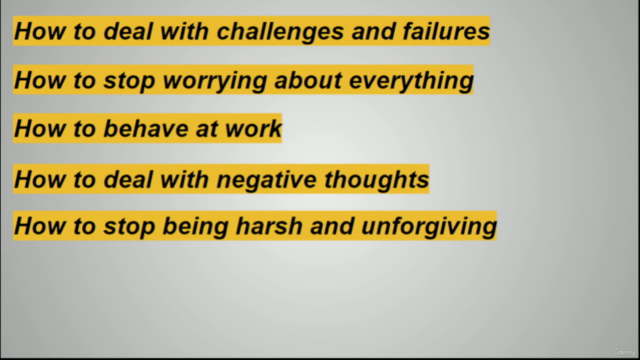How to overcome Perfectionism and Fear of Failure?

Why take this course?
It seems like you're outlining a comprehensive list of topics that address various aspects of personal development, well-being, and self-improvement, with a particular focus on overcoming perfectionism. This is a commendable endeavor, as the challenges outlined are common barriers to a fulfilling life. Here's a brief overview of how one might approach each topic to facilitate personal growth:
-
How to stop worrying about everything: Cognitive-behavioral techniques can be helpful here, such as thought recording and cognitive restructuring to challenge and change unhelpful thoughts. Mindfulness and relaxation strategies like meditation can also help manage worry.
-
How to overcome inner critic: This involves self-compassion exercises, recognizing the patterns of your inner critic, and learning to respond to it with kindness and understanding rather than harsh judgment.
-
How to achieve your goals: Setting SMART (Specific, Measurable, Achievable, Relevant, Time-bound) goals can be effective. Additionally, breaking down larger goals into smaller, actionable steps can make them more manageable and less overwhelming.
-
How to behave at work: This involves understanding workplace dynamics, communication skills, and professional conduct. Role-playing, seeking mentorship, and continuous learning about your industry can also be beneficial.
-
How to say “NO”: Assertiveness training and clear communication skills are key here. Understanding your limits and the value of your time and energy is crucial for saying "no" without guilt.
-
How to deal with negative thoughts: Mindfulness-based cognitive therapy (MBCT) can help in observing thoughts without getting caught up in them. Journaling, exercise, and engaging in creative activities can also shift focus away from negative thought patterns.
-
How to stop being harsh and unforgiving: This requires cultivating empathy towards oneself, practicing forgiveness, and engaging in self-reflection to understand the roots of self-harshness.
-
How to make a decision without stress: Decisional balance testing can help weigh the pros and cons of different options. Trusting your intuition and recognizing that not every decision is irreversible can reduce decision-making stress.
-
How to stop being rigid and inflexible: This involves practicing adaptability in daily life, embracing change, and developing a growth mindset. Yoga and other forms of movement can also promote flexibility in the body and mind.
-
How to overcome the fear of failure: Exposure therapy and cognitive restructuring can help reframe how you perceive failure. Embracing a growth mindset and viewing failures as learning opportunities are also important.
-
How to stop worrying about your body image and weight loss: Focusing on overall health and well-being rather than appearance can be liberating. Body positivity movements and accepting your body as it is can reduce anxiety around body image.
-
How to raise confident and happy children: Modeling positive behavior, encouraging autonomy, and providing unconditional love and support are key. Open communication and teaching resilience and coping skills are also important.
-
How to overcome painful emotions and be happy: This may involve therapy, self-care practices, and building resilience through stress management techniques. It's about finding what brings joy and integrating those activities into your life.
-
How to overcome jealousy: Understanding the roots of jealousy, practicing gratitude for what you have, and engaging in positive social comparisons can help mitigate feelings of jealousy.
-
How to stop judging people: This requires conscious effort to practice non-judgmental observation, understanding that people often behave in complex ways, and remembering that everyone has their own struggles.
-
How to stop having high expectations of people and life: Lowering expectations can lead to greater appreciation for what actually happens. It's about accepting others and the world as they are, not as you think they should be.
-
How to give up perfectionism and start living a happy life: This involves embracing imperfection, celebrating progress over perfection, and understanding that happiness often comes from contentment rather than achievement. Engaging in activities for their own sake, rather than as a means to an end, can also foster happiness.
Remember, these are complex issues, and each person's journey is unique. Professional support from therapists or counselors who specialize in these areas can be incredibly helpful. Additionally, peer support groups and community resources can provide further assistance and a sense of belonging as you navigate this path towards a more balanced and fulfilling life.
Course Gallery




Loading charts...